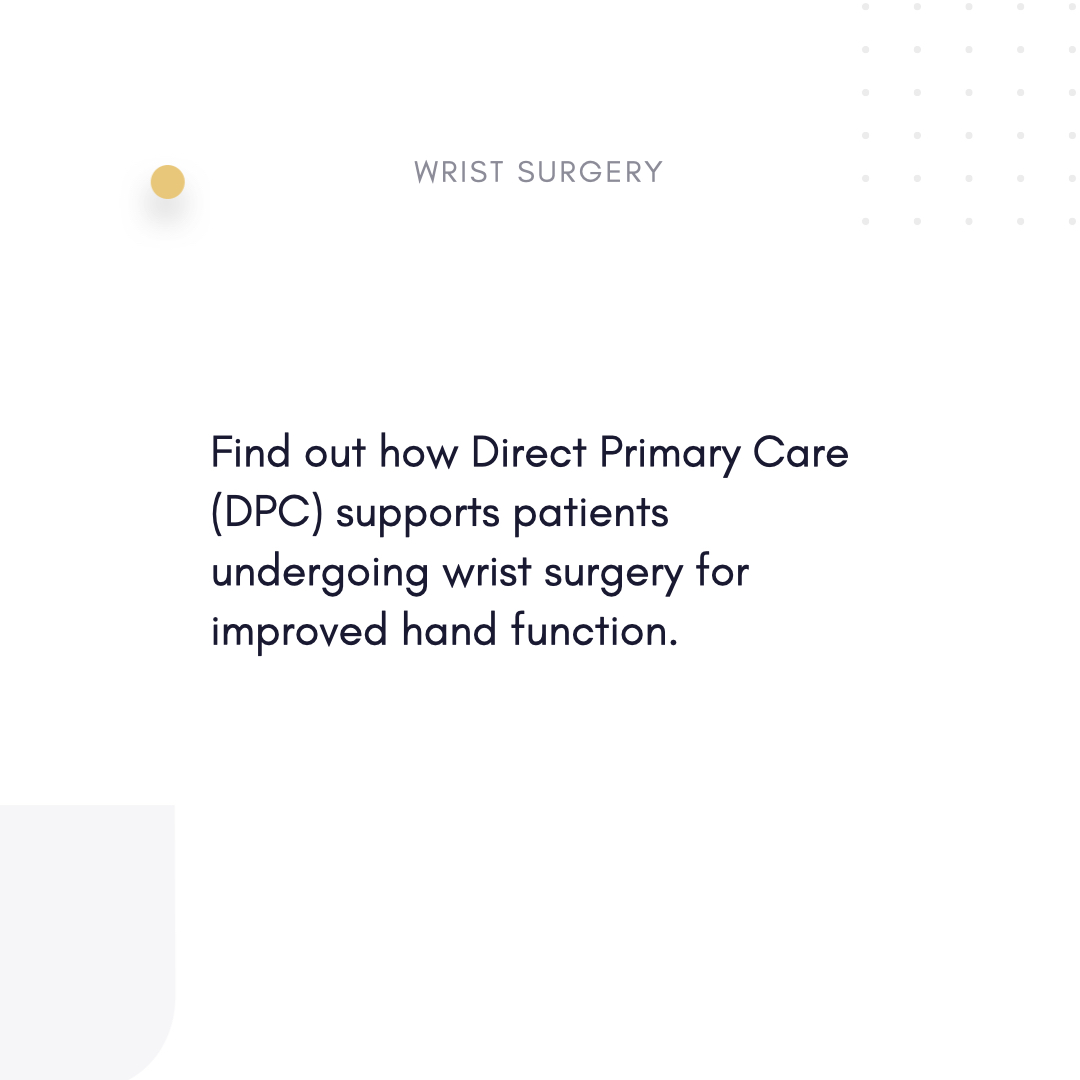Wrist Surgery and Direct Primary Care (DPC): Precision, Partnership, Full Recovery
If a fracture, arthritis, or carpal tunnel makes it hard to use your wrist, surgery can fix it. DPC makes sure your surgery is planned, affordable, and fits your needs for recovery.

Wrist Surgery Explained: How to Get Your Hand Back to Normal
Some common wrist surgeries are:
- Carpal tunnel release: Takes pressure off the nerves.
- ORIF (Open Reduction Internal Fixation): Fixes broken bones with plates and screws.
- Arthroscopy: Fixes torn ligaments or injuries to the TFCC.
Important information:
- Safety: 90–95% success rate; less than 1% chance of getting an infection.
- Costs: DPC memberships (100–300 USD/month) cover consultations and follow-ups, while traditional fees (5,000–15,000 USD/surgery) do not.
Risks of waiting:
- Chronic pain, stiffness, and arthritis.
How DPC Improves the Results of Wrist Surgery
Direct Primary Care (DPC) changes how we care for our hands by putting the patient first and coordinating care ahead of time.
Complete Preparation for Surgery
- Quick tests: Get an X-ray or MRI within 48 hours.
- Prehab programs: Make your grip and forearm muscles stronger.
- Managing medications: Change blood thinners or NSAIDs before surgery.
Clear pricing and all-around help
- Care that covers everything: As a member, you get referrals to surgeons, physical therapy, and splints after surgery.
- Saving money: Self-pay DPC rates can save you 25% to 50% on facility fees.
- Ergonomic advice: Change your workstations to avoid getting hurt again.
Personalized Recovery and Long-Term Health
- Access 24/7: Take care of swelling or numbness right away after surgery.
- Virtual PT: Use telehealth to show people how to do range-of-motion exercises.
- Preventive focus: Suggest ways to protect your joints.
Advantages of DPC for Patients Undergoing Wrist Surgery
- No waiting time: Compared to the usual 6+ weeks, 90% of DPC patients have surgery within 2 weeks.
- Continuity: One team takes care of pain management, wound care, and following through with rehab.
- No extra fees: Prices that are clear (for example, 4,500 USD for carpal tunnel release).
Success Stories from Real Life
- Case 1: Lisa, 40, has a broken scaphoid bone. Lisa's DPC team did an ORIF, and she got back all of her grip strength in 12 weeks.
- Case 2: Raj, who is 55 years old and has bad arthritis. Raj's DPC provider fused his wrist, which ended his chronic pain.
Questions and Answers: Surgery on the wrist in DPC
- Q: How long does it take to heal?
- A: 6 to 12 weeks; don't lift anything heavy for 3 months.
- Q: Do I need a cast or splint?
- A: Yes. DPC makes custom splints and takes them off.
- Q: Is it possible for stiffness to happen?
- A: Yes. DPC plans early PT to help people move around more easily.
- Q: What happens if the surgery doesn't work?
- A: DPC looks into revision surgery or other treatments.
What Makes DPC Great for Hand Care
The American Society for Surgery of the Hand (ASSH) stresses the importance of moving around early. DPC gets things done by:
- Lessening stiffness: Early PT lowers the rate of contractures by 30%.
- Increasing adherence: 95% of people go to PT, compared to 70% in the U.S.
- Cutting costs: Bundled pricing saves members between 2,000 USD and 8,000 USD.
Final Thoughts
Wrist surgery at DPC isn't just about making cuts; it's about full care that brings your hands back to their full potential. With DPC, you can skip referral delays, see the best surgeons, and get a recovery plan that fits your needs. From getting ready for surgery to making precise movements, you can count on care that is as steady as your grip.






